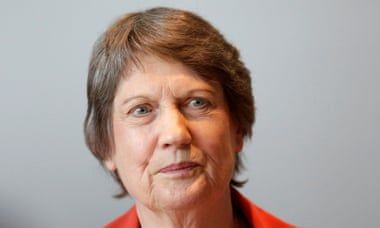
You’ll never have a drug-free society, expert warns UK
The Home Office should climb off its “high horse of oppression and prohibition” and stop pursuing the “fantasy” of a drug-free society, the chair of an influential international consortium on drug policy has said.
As a new global index is set to rank each country’s approach to tackling narcotics, former New Zealand prime minister and chair of the Global Commission on Drug Policy, Helen Clark, said that the UK was fixated with a “self-defeating” strategy to the issue that bred misery.
Clark also said that the Home Office’s approach to drug policy meant it deterred police and crime commissioners in England and Wales who might otherwise advocate for a more liberal strategy.
“The Home Office is a major problem. It’s not thinking outside the box. In the UK, you have crime commissioners and there’s more scope for discretion at the local level with some prepared to push the boundary,” Clark told the Observer.
“But to get that consistently across the United Kingdom, you need the Home Office to get off its high horse of oppression and prohibition and say: ‘Look, we’ve had this wrong, our prisons are thronged with people on drug offences, marginalised swathes of people. It’s costly and self-defeating,” added Clark, whose commission is made up largely of world leaders.
By contrast, she praised Scotland for recognising it had problems – the country has the highest per capita number of deaths relating to drug use in Europe – and signalling that it wanted to look for new solutions.
“Scotland knows it’s shameful. After the last set of [fatality] figures came out, the Scottish government wants to [make a] move,” said Clark.
Her comments come just before the inaugural edition of the global drug policy index which ranks countries according to indicators such as health and harm reduction rather than the traditional law enforcement measures of the numbers of arrests or amount of drugs seized.
 Helen Clark, former prime minister of New
Zealand and chair of the Global Commission on Drug Policy, has told the
UK it must change its approach to drug abuse.
Helen Clark, former prime minister of New
Zealand and chair of the Global Commission on Drug Policy, has told the
UK it must change its approach to drug abuse.
According to the latest National Crime Agency annual report, more than 150 tonnes of drugs were seized at a time when deaths from drug poisoning in England and Wales have hit a record high, prompting charities to warn of a public health emergency.
Advertisement
The index, headed by the International Drug Policy Consortium, a global network of 192 organisations, is intended to question the ambition of achieving a “drug-free society”, which Clark says is futile.
“It’s a fantasy, the total elimination of drugs? Dream on, there’s never been a time in human history where human beings haven’t resorted to some kind of substances that will take them out of their current reality for whatever reason,” she said.
The index arrives 50 years after the UK’s Misuse of Drugs Act came into force, which still forms the basis of its anti-drug strategy – separating illicit substances into classes which carry different penalties – but which is facing increasing calls for reform.
A number of prominent campaigners are pushing for the decriminalisation and regulation of drugs with more than 60 MPs supporting a campaign to review current legislation.
Despite this, the UK is expected to sit in the top 10 of the index’s most progressive countries when it is launched in London on Monday, a ranking that Clark says articulates the current failures of global drug policy.
The index is composed of 75 indicators including criminal justice and extreme responses of the state to the issue. Of the 30 countries featured in its first iteration, eight had decriminalised drug use and just three managed to divert people away from the criminal justice system.
A Home Office spokesperson said: “Drugs damage communities and ruin lives. We must prevent drug use in our communities, support people through treatment and recovery, and tackle the supply of illegal drugs.”
They cited Project ADDER, which it said was “taking a wide-ranging and integrated approach to prevent drug use and support people dependent on drugs through treatment and recovery”.











